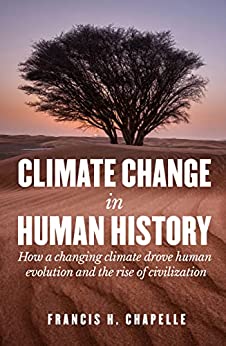About the book
Scandinavian population explosion made possible by the Medieval Warm Period (750 –1300 CE). Conversely, the famine that led to the Russian Time of Troubles (1600-1613 CE) was caused by a dramatic global cooling event that followed the explosion of the super-volcano Huaynaputina in Peru. In the same vein, the outcome of the Battle of Waterloo that led to Napoleon’s final defeat turned on the unusually cool, wet summer of 1815 in Europe caused by the explosion of the Tambora volcano in Indonesia.
The fourteen chronologically organized chapters of this book tell how many historical events—the agricultural revolution and the beginnings of cities (2,400 BCE), the rise and fall of the Western Roman Empire (300 BCE to 400 CE), the cultural renaissance in Europe during the Medieval Warm Period (750 – 1300 CE), the development of the modern atmospheric and geologic sciences due to the 1883 CE explosion of Krakatoa in Indonesia—were influenced by climate change. Finally, recognizing how climate
change has affected human societies in the past can provide useful insight as to how we can deal with climate change in the future.
About The Author
Francis H. Chapelle retired from the U.S. Geological Survey after a forty-year career in 2020. He received B.A. (music) and B.S. (geology) degrees from the University of Maryland and M.S. and Ph.D. degrees (geology) from The George Washington University. His research centered on how microbial processes affect the chemical quality of groundwater in both contaminated and pristine environments. He has authored more than 130 peer-reviewed scientific papers and a textbook (Groundwater Microbiology and Geochemistry, John Wiley & Sons, 1st ed. 1993, 2cd ed. 2000). His work won him the O.E. Meinzer Award in Hydrogeology given by The Geological Society of America, 2000 and the U.S. Geological Survey Distinguished Service Award, 2008. In addition he has written two books for the general reader The Hidden Sea: groundwater, springs, and wells (National Groundwater Association, 2000) and Wellsprings: A natural history of bottled spring waters (Rutgers University Press, 2005). His interest in climate change began in 1982 when he discovered that the hydrology of the Atlantic Coastal Plain had been extensively modified during low stands of the oceans during the ice ages (sea level 400 feet below present) when rivers eroded through and truncated both sandy aquifers and their clayey confining beds.
This ABC Books author of the week was featured on KSGF Mornings with Nick on Thursday, May 25, 2023.








